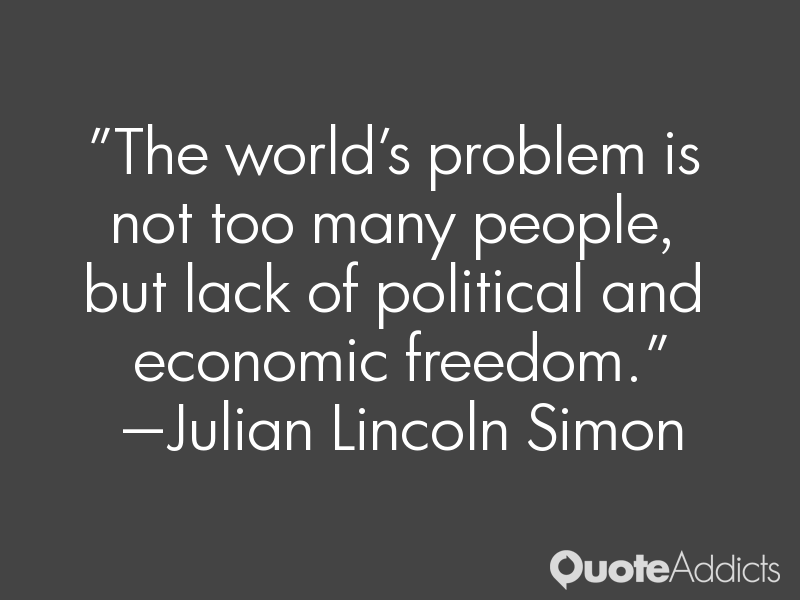Julian Lincoln Simon is a name that resonates deeply in the world of economics, resource studies, and population dynamics. Known for his groundbreaking theories and optimistic outlook on humanity's ability to solve resource challenges, Simon remains one of the most influential thinkers of the 20th century. His work challenges conventional beliefs about overpopulation and resource scarcity, offering a fresh perspective on how innovation and human ingenuity can overcome perceived limitations.
As we explore the life and contributions of Julian Lincoln Simon, this article will delve into his biography, key ideas, and lasting impact on modern economic thought. By understanding his unique approach to resource management and population studies, readers will gain a deeper appreciation for how Simon's optimism continues to inspire future generations of economists and policymakers.
Throughout this article, we will examine Simon's groundbreaking theories, his controversial debates with other scholars, and his legacy in shaping contemporary discussions around sustainable development. Whether you're a student of economics, an environmental enthusiast, or simply curious about how humanity can thrive amidst challenges, this article offers a comprehensive look into the life and work of Julian Lincoln Simon.
Read also:Steveos Wife The Untold Story Behind The Madness
Table of Contents
- Biography of Julian Lincoln Simon
- Early Life and Education
- Key Contributions to Economics
- Resource Theory and Innovation
- Population Dynamics and Overpopulation
- The Famous Bet with Paul Ehrlich
- Legacy and Impact on Modern Thought
- Criticism and Controversies
- Data-Driven Insights from Simon's Work
- Conclusion and Call to Action
Biography of Julian Lincoln Simon
Personal Information
Julian Lincoln Simon was born on February 12, 1932, in Newark, New Jersey. He dedicated his life to studying economics, demographics, and resource management, leaving behind a legacy that continues to influence global discussions on sustainability and human potential. Below is a summary of his personal information:
| Full Name | Julian Lincoln Simon |
|---|---|
| Date of Birth | February 12, 1932 |
| Place of Birth | Newark, New Jersey, USA |
| Date of Death | February 8, 1998 |
| Occupation | Economist, Author, Professor |
| Education | Ph.D. in Business Economics from Harvard University |
| Notable Works | "The Ultimate Resource," "The Resourceful Earth" |
Simon's life was marked by a relentless pursuit of knowledge and a commitment to challenging conventional wisdom. His work remains a cornerstone of modern economic theory, particularly in the areas of resource management and population studies.
Early Life and Education
Julian Lincoln Simon's early life laid the foundation for his future contributions to economics. Growing up in Newark, New Jersey, Simon demonstrated a keen interest in mathematics and problem-solving from a young age. After completing his undergraduate studies, he pursued a Ph.D. in Business Economics at Harvard University, where he developed his expertise in resource economics and demographics.
Simon's academic journey was characterized by a deep curiosity about how human ingenuity could address the challenges of resource scarcity. His early research focused on the intersection of economics and population studies, setting the stage for his groundbreaking theories later in life.
Key Contributions to Economics
Julian Lincoln Simon's Theories on Resource Scarcity
One of Julian Lincoln Simon's most significant contributions to economics is his theory that resource scarcity is not a fixed limitation but rather a challenge that can be overcome through human innovation. In his seminal book, "The Ultimate Resource," Simon argued that the human mind is the most valuable resource, capable of generating solutions to even the most pressing problems.
- Human Ingenuity as a Solution: Simon believed that human creativity and technological advancements could mitigate the effects of resource scarcity.
- Market Mechanisms: He emphasized the role of market forces in allocating resources efficiently and encouraging innovation.
- Optimism About the Future: Simon's work challenged the pessimistic views of other scholars, offering a hopeful vision of humanity's ability to thrive amidst challenges.
Resource Theory and Innovation
Simon's resource theory is centered around the idea that resources are not finite but are instead limited by our ability to discover and utilize them effectively. He argued that as resources become scarce, their prices increase, incentivizing innovation and the development of substitutes. This dynamic process ensures that humanity can continue to grow and prosper without being constrained by resource limitations.
Read also:Hyungry Telegram Unlocking The Power Of Community And Communication
According to Simon, the key to overcoming resource challenges lies in fostering an environment that encourages creativity, entrepreneurship, and technological advancement. By investing in education and innovation, societies can harness the full potential of their most valuable resource: the human mind.
Population Dynamics and Overpopulation
Challenging Conventional Beliefs
Julian Lincoln Simon was a vocal critic of the conventional wisdom surrounding overpopulation. While many scholars and policymakers viewed population growth as a threat to global stability, Simon saw it as an opportunity for economic growth and innovation. He argued that more people meant more minds working to solve problems and create new solutions.
Simon's perspective on population dynamics was rooted in his belief that human ingenuity could overcome the challenges posed by a growing population. He emphasized the importance of investing in education, healthcare, and economic development to ensure that population growth contributes positively to societal progress.
The Famous Bet with Paul Ehrlich
One of the most notable moments in Julian Lincoln Simon's career was his famous bet with environmentalist Paul Ehrlich. In 1980, Simon wagered that the prices of five key metals—chromium, copper, nickel, tin, and tungsten—would decrease over the next decade, defying Ehrlich's prediction that resource scarcity would lead to rising prices. Ten years later, Simon emerged victorious as the prices of all five metals had indeed fallen, underscoring his belief in the power of human ingenuity and market mechanisms.
This bet became a symbol of Simon's optimism and a testament to his conviction that humanity could overcome resource challenges through innovation and adaptability.
Legacy and Impact on Modern Thought
Julian Lincoln Simon's legacy extends far beyond his lifetime, influencing contemporary discussions on sustainability, resource management, and population dynamics. His work continues to inspire economists, policymakers, and environmentalists to rethink conventional approaches to addressing global challenges.
Today, Simon's ideas are more relevant than ever as the world grapples with issues such as climate change, energy transition, and sustainable development. By emphasizing the importance of human ingenuity and innovation, Simon's work provides a valuable framework for addressing these challenges and ensuring a brighter future for generations to come.
Criticism and Controversies
Despite his many contributions, Julian Lincoln Simon's work has not been without controversy. Critics argue that his optimistic views on resource scarcity and population growth overlook the environmental costs of unchecked economic development. Some also question the long-term sustainability of relying solely on market mechanisms and technological advancements to address global challenges.
Nevertheless, Simon's work remains a valuable contribution to the ongoing debate about how best to manage resources and ensure sustainable growth. By engaging with both supporters and critics, his ideas continue to shape the conversation around these critical issues.
Data-Driven Insights from Simon's Work
Simon's research is supported by extensive data and statistical analysis, providing a robust foundation for his theories. For example, his analysis of historical trends in resource prices and population growth demonstrates the dynamic nature of resource scarcity and the role of innovation in overcoming these challenges.
According to data from the World Bank and other reputable sources, many of Simon's predictions about the declining prices of key resources have been borne out over time. This underscores the validity of his theories and their relevance to contemporary discussions on sustainability and economic development.
Conclusion and Call to Action
In conclusion, Julian Lincoln Simon's work has left an indelible mark on the fields of economics, resource management, and population studies. His optimistic vision of humanity's ability to overcome resource challenges through innovation and ingenuity continues to inspire scholars and policymakers around the world.
As we face the pressing challenges of the 21st century, Simon's ideas offer a valuable framework for addressing these issues and ensuring a sustainable future for all. We invite readers to engage with Simon's work, share their thoughts in the comments section, and explore other articles on our site that delve deeper into the topics discussed here.
Together, we can continue to build on Simon's legacy and work towards a brighter, more sustainable future for generations to come.


